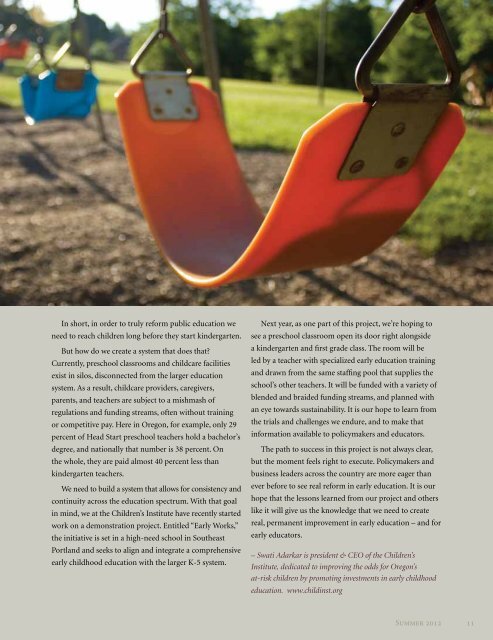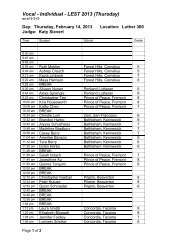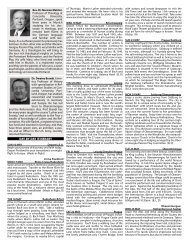Summer 2012 - "Education Perspectives" - Concordia University
Summer 2012 - "Education Perspectives" - Concordia University
Summer 2012 - "Education Perspectives" - Concordia University
You also want an ePaper? Increase the reach of your titles
YUMPU automatically turns print PDFs into web optimized ePapers that Google loves.
In short, in order to truly reform public education we<br />
need to reach children long before they start kindergarten.<br />
But how do we create a system that does that?<br />
Currently, preschool classrooms and childcare facilities<br />
exist in silos, disconnected from the larger education<br />
system. As a result, childcare providers, caregivers,<br />
parents, and teachers are subject to a mishmash of<br />
regulations and funding streams, often without training<br />
or competitive pay. Here in Oregon, for example, only 29<br />
percent of Head Start preschool teachers hold a bachelor’s<br />
degree, and nationally that number is 38 percent. On<br />
the whole, they are paid almost 40 percent less than<br />
kindergarten teachers.<br />
We need to build a system that allows for consistency and<br />
continuity across the education spectrum. With that goal<br />
in mind, we at the Children’s Institute have recently started<br />
work on a demonstration project. Entitled “Early Works,”<br />
the initiative is set in a high-need school in Southeast<br />
Portland and seeks to align and integrate a comprehensive<br />
early childhood education with the larger K-5 system.<br />
Feature Story<br />
Next year, as one part of this project, we’re hoping to<br />
see a preschool classroom open its door right alongside<br />
a kindergarten and first grade class. The room will be<br />
led by a teacher with specialized early education training<br />
and drawn from the same staffing pool that supplies the<br />
school’s other teachers. It will be funded with a variety of<br />
blended and braided funding streams, and planned with<br />
an eye towards sustainability. It is our hope to learn from<br />
the trials and challenges we endure, and to make that<br />
information available to policymakers and educators.<br />
The path to success in this project is not always clear,<br />
but the moment feels right to execute. Policymakers and<br />
business leaders across the country are more eager than<br />
ever before to see real reform in early education. It is our<br />
hope that the lessons learned from our project and others<br />
like it will give us the knowledge that we need to create<br />
real, permanent improvement in early education – and for<br />
early educators.<br />
– Swati Adarkar is president & CEO of the Children’s<br />
Institute, dedicated to improving the odds for Oregon’s<br />
at-risk children by promoting investments in early childhood<br />
education. www.childinst.org<br />
<strong>Summer</strong> <strong>2012</strong><br />
11







